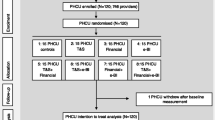Abstract
Previous studies show that elements of spirituality, including prayer and religious services, may contribute to reductions in harmful alcohol use. The objective of this study was to assess the acceptability of prayer as a component of emergency department (ED) interventions for risky alcohol use. A 12-question multiple-choice questionnaire was developed, piloted, and refined by the study team. The questionnaire included questions about current beliefs and attitudes toward prayer and assessed interest in various means of delivering prayer or prayer support for reducing alcohol use. The questionnaire was administered to a consecutive sample of 111 patients recruited from the 12-month follow-up of a parent RCT study on reducing alcohol use among injured ED patients (ReDIAL). To qualify for the parent study, participants needed an ASSIST v3.0 alcohol score ≥ 11. 90 participants (81%) consented to answer questions about prayer. The participating sample was 38% female and 29% nonwhite; mean age was 36 years. Of these participants, 64% reported that they currently pray; of those, 88% reported praying daily or weekly; 79% agreed that prayer helps with coping in difficult times; 68% agreed that prayer could assist in achieving difficult goals; and 48% agreed that prayer helps reduce alcohol use. Interest in various means of utilizing prayer to reduce alcohol use was assessed in all participants (regardless of whether they currently prayed or not): 45% were interested in having others pray for them to reduce alcohol use; 40% were interested in receiving text reminders to pray; 42% were interested in receiving text messages with specific prayers to use; and 47% were interested in receiving text messages that someone was praying for them. 33.3% of the entire sample stated that they would attend services if provided information on spiritual or religious groups in the community. The incorporation of prayer in alcohol interventions was considered acceptable by a proportion of our sample of risky alcohol users, even those who do not currently use prayer as a resource in their lives. Given the promising data on ED patients’ perceptions of the significance and acceptability of spiritual practices in reducing alcohol use, prayer may emerge as a useful adjunctive tool in future ED interventions for alcohol use disorders.

Similar content being viewed by others
References
Gorsuch, R. (1995). Religious aspects of substance abuse and recovery. Journal of Social Issues,51, 65–83.
Humeniuk, R., Ali, R., Babor, T. F., et al. (2008). Validation of the alcohol, smoking and substance involvement screening test (ASSIST). Addiction,103(6), 1039–1047. https://doi.org/10.1111/j.1360-0443.2007.02114.x.
Johnson, T. J., Sheets, V. L., & Kristeller, J. L. (2008). Identifying mediators of the relationship between religiousness/spirituality and alcohol use. Journal of Studies on Alcohol and Drugs,69(1), 160–170.
Kelly, J. F., Stout, R. L., Magill, M., Tonigan, J. S., & Pagano, M. E. (2011). Spirituality in recovery: A lagged mediational analysis of alcoholics anonymous’ principal theoretical mechanism of behavior change. Alcoholism, Clinical and Experimental Research,35(3), 454–463. https://doi.org/10.1111/j.1530-0277.2010.01362.x.
Mello, M. J., Baird, J., Lee, C., Strezsak, V., French, M. T., & Longabaugh, R. (2016). A randomized controlled trial of a telephone intervention for alcohol misuse with injured emergency department patients. Annals of Emergency Medicine,67(2), 263–275. https://doi.org/10.1016/j.annemergmed.2015.09.021.
McCord, G., Gilchrist, V. J., Grossman, S. D., et al. (2016). Discussing spirituality with patients: a rational and ethical approach. The Annals of Family Medicine,2(4), 356–361.
Mello, M. J., Longabaugh, R., Baird, J., Nirenberg, T., & Woolard, R. (2008). DIAL: A telephone brief intervention for high-risk alcohol use with injured emergency department patients. Annals of Emergency Medicine,51(6), 755–764. https://doi.org/10.1016/j.annemergmed.2007.11.034.
NIAAA. (2016). What’s “at-risk” or “heavy” drinking? Rethinking drinking. US Department of Health & Human Services. NIH Publication No. 15-3770. https://www.rethinkingdrinking.niaaa.nih.gov/How-much-is-too-much/Is-your-drinking-pattern-risky/Whats-At-Risk-Or-Heavy-Drinking.aspx. Accessed March 30, 2018.
Nilsen, P., Baird, J., Mello, M. J., et al. (2008). A systematic review of emergency care brief alcohol interventions for injury patients. Journal of Substance Abuse Treatment,35(2), 184–201. https://doi.org/10.1016/j.jsat.2007.09.008.
Pargament, K. I., Murray-Swank, N. A., & Tarakeshwar, N. (2005). An empirically-based rationale for a spiritually-integrated psychotherapy. Mental Health, Religion & Culture, 8(3), 155–165. https://doi.org/10.1080/13694670500138940.
Post, S. G., Puchalski, C. M., & Larson, D. B. (2000). Physicians and patient spirituality: Professional boundaries, competency, and ethics. Annals of Internal Medicine, 132(7), 578–583.
Robinson, E. A. R., Cranford, J. A., Webb, J. R., & Brower, K. J. (2007). Six-month changes in spirituality, religiousness, and heavy drinking in a treatment-seeking sample. Journal of Studies on Alcohol and Drugs,68(2), 282–290.
Saunders, S. M., Lucas, V., & Kuras, L. (2007). Measuring the discrepancy between current and ideal spiritual and religious functioning in problem drinkers. Psychology of Addictive Behaviors,21(3), 404–408. https://doi.org/10.1037/0893-164X.21.3.404.
Schjødt, U., Stødkilde-Jørgensen, H., Geertz, A. W., & Roepstorff, A. (2008). Rewarding prayers. Neuroscience Letters,443(3), 165–168. https://doi.org/10.1016/j.neulet.2008.07.068.
Stoker, M., & Landry, A. (2015). Faith and religion in the emergency department. Academic Emergency Medicine,22(1), 124. https://doi.org/10.1111/acem.12556.
Tonigan, J. S., Miller, W. R., & Schermer, C. (2002). Atheists, agnostics and alcoholics anonymous. Journal of Studies on Alcohol,63(5), 534–541.
Tusa, A. L., & Burgholzer, J. A. (2013). Came to believe. Journal of Addictions Nursing, 24(4), 237–246.
U.S. Religious Landscape Survey. (2008). Summary of key findings. http://religions.pewforum.org/pdf/report2religious-landscape-study-key-findings.pdf. Accessed March 1, 2016.
Walton, M. A., Chermack, S. T., Shope, J. T., et al. (2010). Effects of a brief intervention for reducing violence and alcohol misuse among adolescents: A randomized controlled trial. JAMA,304(5), 527–535. https://doi.org/10.1001/jama.2010.1066.
Author information
Authors and Affiliations
Corresponding author
Ethics declarations
Conflict of interest
All authors of this manuscript declare that they have no conflicts of interest to report.
Additional information
Publisher's Note
Springer Nature remains neutral with regard to jurisdictional claims in published maps and institutional affiliations.
Rights and permissions
About this article
Cite this article
Ahn, S., Mello, M., Baird, J. et al. Emergency Department Patients are Receptive to Prayer-Based Interventions to Reduce Alcohol Use. J Relig Health 59, 1913–1924 (2020). https://doi.org/10.1007/s10943-019-00779-w
Published:
Issue Date:
DOI: https://doi.org/10.1007/s10943-019-00779-w




